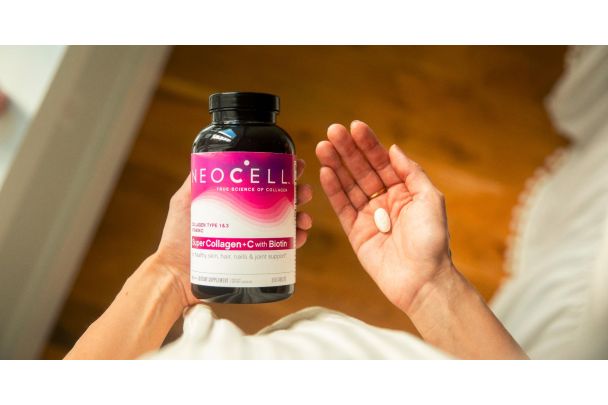Hydrolyzed collagen has been getting a lot of attention lately, so much so that supplements made with hydrolyzed collagen are among the most popular health and beauty products on the market today.
But what exactly is hydrolyzed collagen? How does it differ from plain old collagen? And in what ways does it benefit the body? The following is a helpful introduction to hydrolyzed collagen and its role in supporting health and beautiful skin.
First things first, what is collagen?
Collagen is the most abundant—and some would say the most important—protein in the human body. It is made up of amino acids and can be found in our skin, bones, joints, muscles, hair, and nails.
Collagen is a complex structural protein that maintains strength and flexibility throughout the body. Considered a vital structural building block, collagen is often compared to the scaffolding of a building: an invisible support system that holds the body together and keeps it strong. It also helps to keep our skin supple and young looking.
Unfortunately, normal collagen production declines with age, causing our skin to lose elasticity. As we age, collagen cross-linking and depletion can lead to common signs of aging in the skin, muscles, tendons, ligaments, and bones.
This can lead to visible signs of aging such as wrinkles and sagging skin. For this reason, getting additional collagen from dietary supplements may provide added support as we get older.*
What’s the difference between collagen and hydrolyzed collagen?
The complex collagen molecule itself has a high molecular weight and size which means it may not be absorbed as well as hydrolyzed collagen.
Hydrolyzed collagen is simply collagen that has been broken down, through a process called hydrolysis, into smaller amino acid chains called collagen peptides, which are more readily absorbed by the body. Hydrolyzed collagen can provide some of the building blocks our bodies need to make collagen (or other proteins).
(Note: You will often see the terms hydrolyzed collagen, collagen peptides, and collagen hydrolysate used interchangeably on dietary supplements, as they refer to the process of breaking down the collagen molecule to be better absorbed.)
Where does collagen come from?
The human body produces collagen in its cells (mainly in the connective tissue cells), but it is also found in the skin, bones, and connective tissue of animals, especially mammals; this is where the collagen for dietary supplements is sourced. The predominant sources for Type I and III supplemental collagen are bovine (beef) and marine collagen from fish. Type II collagen is typically sourced from chicken.
At present, there is no plant-based collagen. However, there are nutrients in some foods that are required for the production of collagen, such as vitamin C. This is why you may see vegetarian or vegan supplements with ingredients that provide support for natural collagen production, but they do not contain actual collagen.
Why do I need a collagen supplement? Can’t I just eat more meat and fish?
We typically do not consume the parts of animals and fish that provide collagen. In addition, the small amount consumed is often considerably less than the amount demonstrated in human studies to offer benefits. Thus, it makes sense to get additional collagen from dietary supplements.
Taking a readily absorbable hydrolyzed collagen supplement promotes healthy collagen synthesis and provides us with the amino acids our bodies need to produce important proteins, such as those in our hair and nails.*
Not to mention collagen supplements are extremely convenient. Instead of trying to load up on beef, pork, and chicken, dietary collagen is often available in a powder supplement that mixes easily with beverages and soft foods.
What are the benefits of taking dietary collagen?
Countless studies have linked hydrolyzed collagen to overall wellness benefits, from healthy hair, skin, and nails to joint health.
One study looked at nearly 70 women in their 30s, 40s, and 50s to determine whether or not supplementation was linked to skin benefits. According to their findings, researchers determined that after two months of daily collagen use, participants saw a “statistically significant improvement” in skin elasticity as well as a positive influence on skin moisture.
More recently, a 2019 review of existing clinical literature regarding collagen-based dietary supplements for skin health concluded that, “Preliminary results are promising for the short- and long-term use of oral collagen supplements for aging skin. Oral collagen supplements also increase skin elasticity, hydration, and dermal collagen density.”
And, with regard to joint health, a nearly six-month-long study involving young athletes found that taking supplemental hydrolyzed collagen may promote healthy joints.
In truth, these studies represent the tip of the iceberg in terms of what we know about dietary collagen and overall wellness. Scientists are also looking into the benefits of collagen for heart health, weight management, improved bone density, and more.











Share: